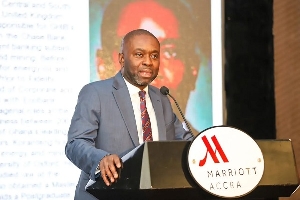 Edward Koranteng, CEO of Minerals Income Investment Fund (MIIF)
Edward Koranteng, CEO of Minerals Income Investment Fund (MIIF)
The Minerals Income Investment Fund (MIIF) is banking on its Small-Scale Mining Incubation Programme (SSMIP), a comprehensive initiative, to reshape the domestic small-scale gold mining industry.
This sector, contributing approximately 40 percent of Ghana’s gold output and employing about 10 percent of the working population, has long been a critical yet challenging component of the country’s economy.
Edward Nana Yaw Koranteng, Chief Executive of MIIF, outlined the programme’s objectives in a recent interview. “The small-scale mining sector is a significant employer, outpacing even large-scale mining in job creation,” Koranteng stated.
“However, it is also where we face our most pressing environmental challenges, particularly with issues like galamsey (illegal mining),” he added. The SSMIP aims to address these challenges while boosting the sector’s productivity and sustainability.
The programme is structured around four primary channels of support: provision of working capital, assistance in purchasing environmentally sustainable mining machinery, support for corporate governance structures and responsible mining practices, and access to international markets through the MIIF Gold Trade Desk. This multifaceted approach seeks to address the complex issues facing small-scale miners in the country.
MIIF’s initiative comes as the environmental impact of unregulated mining activities has led to the destruction of cocoa farms and the pollution of water bodies, threatening both the ecosystem and the livelihoods of local communities. The SSMIP’s emphasis on environmental sustainability and responsible mining practices is crucial in this context.
The programme’s design involved extensive stakeholder engagement, including consultations with various government agencies and industry associations. From an initial list of 60 licensed small-scale entities, 10 have been selected for the pilot phase following thorough evaluations and site visits. A Technical Review Panel has recommended conducting Preliminary Economic Assessments on all entities to further de-risk the programme for investment decision-making.
Mr. Koranteng stressed the importance of public engagement in the programme’s success. “We need to create advocates from the public, communities, and schools to raise awareness about the consequences of environmental degradation,” he said. “If we’re not able to protect the environment, this is what we lose.”
He remains optimistic about the programme’s potential, noting the emergence of a critical mass of environmental advocates in the country.
“I am optimistic that we will win this battle, but MIIF cannot do it alone. It is a collective effort, and that is why we are actively advocating with miners, schools, and the general public.
“We need to paint a vivid picture of the devastating consequences of neglecting environmental protection. It is a challenging task, but with grit, understanding, and dedication, we can overcome it. This is a global issue, but we have a strong foundation in Ghana,” Mr. Koranteng explained.
“As we position ourselves to make mining a cornerstone of its economy, the SSMIP could serve as a model for other African countries grappling with similar challenges in their mining sectors. Its success will depend on effective implementation, continuous monitoring, and the ability to adapt to challenges as they arise,” he further stated.